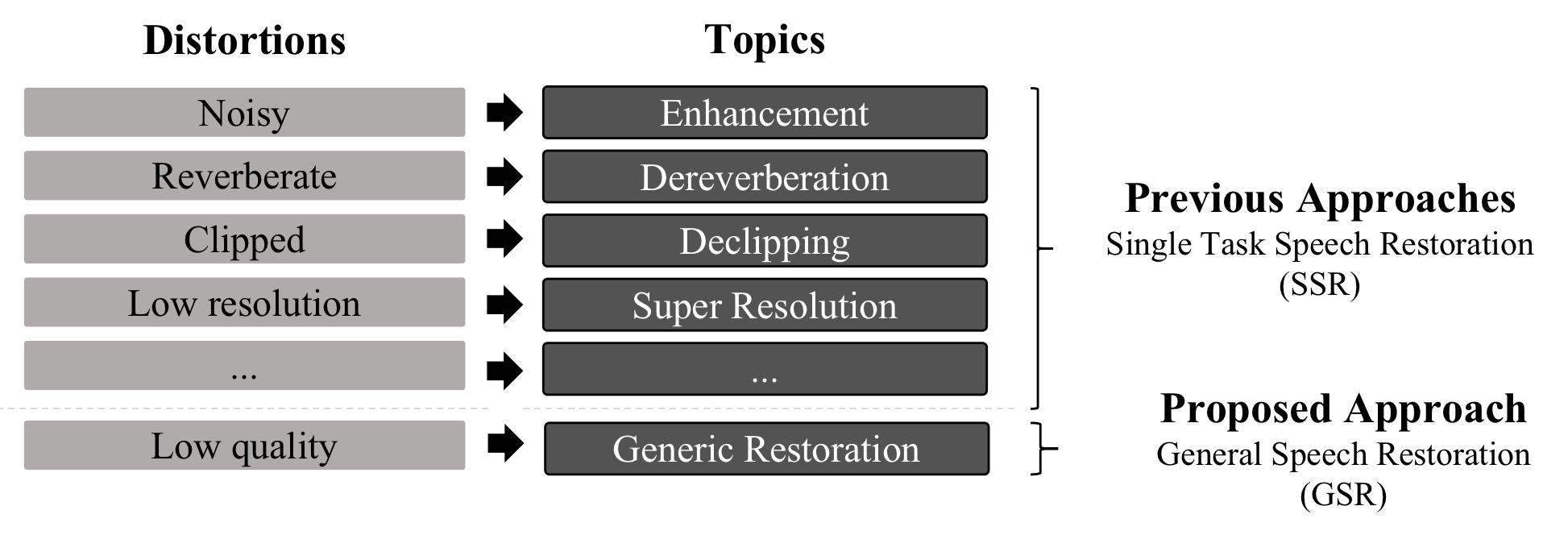VoiceFixer is a framework for general speech restoration. We aim at the restoration of severely degraded speech and historical speech.
# Download dataset and prepare running environment
source init.sh Here we take VF_UNet(voicefixer with unet as analysis module) as an example. Other GSR model have the similar folder structure, training entry and evaluation logic.
Change directory and run training entry.
cd general_speech_restoration/voicefixer/unet
# Use default settings
source run.shAlso you can personalize your training:
- By modifying aug_conf in voicefixer/config.py you can setup the augmentation parameters.
- By changing --aug_effects flag in run.sh. You can have more augmentation effects.
- For example: You can pass in --aug_effects low_pass clip reverb_rir reverb_freeverb high_pass treble bass fade
- ...
After that, you will automatically get a log directory that look like this
├── unet
├── pc_log
└── 2021-09-30-unet-#vocalsnoise#-#vctkvd_noise#-#gsr#-voicefixer_unet-l1#1500_44100#
└── version_0
├── args.pkl
└── checkpoints
└── epoch=1.ckpt
├── code # Pin the version of code you use
│ ├── config.py
│ ├── dm_sr_rand_sr_order.py
│ ├── get_model.py
│ ├── handler.py
│ ├── model.py
│ ├── model_kqq.py
│ ├── modules.py
│ ├── run.sh
│ └── train.py
├── events.out.MacBook-Pro.local.3521.0 # tensorboard
├── git_version # git commit id when you run the code
└── hparams.yamlAutomatic evaluation and generate .csv file for the GSR evaluation results.
First you should stay in the following directory:
cd general_speech_restoration/voicefixer/unetFor example, if you like to evaluate on all testset.
python3 handler.py -c log/2021-09-30-xxx/version_0/checkpoints/epoch=1.ckpt \
-t base \
-d all_test_set For example, if you just wanna evaluate on GSR testset.
python3 handler.py -c log/2021-09-30-xxx/version_0/checkpoints/epoch=1.ckpt \
-t general_speech_restoration \
-d general_speech_restoration_eval There are generally seven testsets you can pass to -t:
- base: all testset
- clip: testset with speech that have clipping threshold of 0.1, 0.25, and 0.5
- reverb: testset with reverberate speech
- general_speech_restoration: testset with speech that contain all kinds of random distortions
- enhancement: testset with noisy speech
- speech_super_resolution: testset with low resolution speech that have sampling rate of 2kHz, 4kHz, 8kHz, 16kHz, and 24kHz.
And if you would like to evaluate on a small portion of data, e.g. 10 utterance.
python3 handler.py -c log/2021-09-30-xxx/version_0/checkpoints/epoch=1.ckpt \
-t base \
-d only_ten_utterance_for_each_testset \
-l 10 Evaluation results will be presented in the exp_results folder.
To sum, handler.py accept the following input format.
# Basic usage
python3 handler.py -c <str, path-to-checkpoint> \
-t <str, testset> \
-l <int, limit-utterance-number> \
-d <str, description of this evaluation> \
Here we take enhancement UNet(Enh-UNet) as an example. Other SSR model have the similar folder structure, training entry and evaluation logic.
Change directory and run training entry
cd single_task_speech_restoration/enhancement/unet
# Using default setting
source run.sh After that, you will automatically get a log directory that look like this
├── unet
├── pc_log
└── 2021-09-30-unet-#vocalsnoise#-#vctkvd_noise#-##-fixed_4k_44k_mask_gan-l1#44100_44100#
└── version_0
├── args.pkl
├── checkpoints
├── code
│ ├── config.py
│ ├── dm_sr_rand_sr_order.py
│ ├── get_model.py
│ ├── handler.py
│ ├── model.py
│ ├── model_kqq.py
│ ├── modules.py
│ ├── run.sh
│ └── train.py
├── git_version
└── hparams.yamlAutomatic evaluation and generate .csv file for the GSR evaluation results.
cd single_task_speech_restoration/declip/unetFor example, if you like to evaluate on clipping testset.
python3 handler.py -c log/2021-09-30-xxx/version_0/checkpoints/epoch=1.ckpt \
-t clip \
-d declipping_model_evaluation If you like to evaluate on GSR testset.
python3 handler.py -c log/2021-09-30-xxx/version_0/checkpoints/epoch=1.ckpt \
-t general_speech_restoration \
-d declipping_model_evaluation_with_GSR_testset There are generally seven testsets you can pass to -t:
- base: all testset
- clip: testset with speech that have clipping threshold of 0.1, 0.25, and 0.5
- reverb: testset with reverberate speech
- general_speech_restoration: testset with speech that contain all kinds of random distortions
- enhancement: testset with noisy speech
- speech_super_resolution: testset with low resolution speech that have sampling rate of 2kHz, 4kHz, 8kHz, 16kHz, and 24kHz.
And if you would like to evaluate on a small portion of data, e.g. 10 utterance.
python3 handler.py -c log/2021-09-30-xxx/version_0/checkpoints/epoch=1.ckpt \
-t base \
-d all_test_set \
-l 10 Evaluation results will be presented in the exp_results folder.
To sum, handler.py accept the following input format.
# Basic usage
python3 handler.py -c <str, path-to-checkpoint> \
-t <str, testset> \
-l <int, limit-utterance-number> \
-d <str, description of this evaluation> \
.
├── dataloaders
│ ├── augmentation # code for speech data augmentation.
│ └── dataloader # code for different kinds of dataloaders.
├── datasets
│ ├── datasetParser # code for preparing each dataset
│ └── se # Dataset for speech enhancement (source init.sh)
│ ├── RIR_44k # Room Impulse Response 44.1kHz
│ │ ├── test
│ │ └── train
│ ├── TestSets # Evaluation datasets
│ │ ├── ALL_GSR # General speech restoration testset
│ │ │ ├── simulated
│ │ │ └── target
│ │ ├── DECLI # Speech declipping testset
│ │ │ ├── 0.1 # Different clipping threshold
│ │ │ ├── 0.25
│ │ │ ├── 0.5
│ │ │ └── GroundTruth
│ │ ├── DENOISE # Speech enhancement testset
│ │ │ └── vd_test
│ │ │ ├── clean_testset_wav
│ │ │ └── noisy_testset_wav
│ │ ├── DEREV # Speech dereverberation testset
│ │ │ ├── GroundTruth
│ │ │ └── Reverb_Speech
│ │ └── SR # Speech super resolution testset
│ │ ├── GroundTruth
│ │ └── cheby1
│ │ ├── 1000 # Different cutoff frequencies
│ │ ├── 12000
│ │ ├── 2000
│ │ ├── 4000
│ │ └── 8000
│ ├── vd_noise # Noise training dataset
│ └── wav48 # Speech training dataset
│ ├── test # Not used, included for completeness
│ └── train
├── evaluation # The code for model evaluation
├── exp_results # The Folder that store evaluation result (in handler.py).
├── general_speech_restoration # GSR
│ ├── unet # GSR_UNet
│ │ └── model_kqq_lstm_mask_gan
│ └── voicefixer # Each folder contains the training entry for each model.
│ ├── dnn # VF_DNN
│ ├── lstm # VF_LSTM
│ ├── unet # VF_UNet
│ └── unet_small # VF_UNet_S
├── resources
├── single_task_speech_restoration # SSR
│ ├── declip_unet # Declip_UNet
│ ├── derev_unet # Derev_UNet
│ ├── enh_unet # Enh_UNet
│ └── sr_unet # SR_UNet
├── tools
└── callbacks


